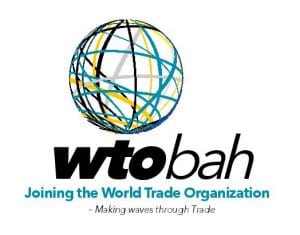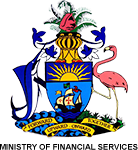STATEMENT BY ZHIVARGO LAING CHIEF NEGOTIATOR ON THE OCCASION OF THE RELEASE OF THE BAHAMAS CURRENT GOODS AND SERVICES OFFERS IN WTO TRADE NEGOTIATIONS
WEDNESDAY, 9th JANUARY, 2019
 When I accepted the post of Chief Negotiator, I committed to the following:
When I accepted the post of Chief Negotiator, I committed to the following:
1. A dogged focus on the promotion, protection and progression of The Bahamas’ interest first;
2. My most professional and expert service to the Government and people of The Bahamas;
3. An absolute commitment to openness and collaboration with the private business sector;
4. A thorough effort to keep the Bahamian public informed of this process every step of the way; and
5. Only advising of the adoption of membership provided that net gains to our country are secured.
By its representation here today, I believe the Bahamas Chamber of Commerce will confirm our hand-in-hand commitment to openness and collaboration. Today, at the start of this new year, I am pleased to fulfill our commitment to keep the Bahamian public informed of our every step all the way by releasing both the goods and services offers that were put to the WTO members in August of last year. I will also comment broadly on the responses received to that offer by countries; broadly because our negotiations remain live and it would not be in in our interest to disclose the specifics of one country’s offer to us as opposed to another or to dishonor the good faith we must show in the course of these negotiations.
Let me say upfront here that the way offers are made during WTO negotiations are standardized by member states who make up the WTO member states. The format, inclusive of terminology, of the offers are the same for all. It is therefore necessary to understand how to read the offers so as to be able to make sense of them. So I wish to provide some guidance to all in that reading.
Goods Offer
The Goods Offer is less complicated, consisting of an Excel Table Format with five columns. The first column to the left is the HS number, the second is the description of the product traded, the third is the current customs duty rate we apply, the fourth is the maximum customs duty rate we commit ourselves to applying if we accede (the “bound” rate) and the fifth column represents any other duties or charges we expect to charge. What will become abundantly clear from reading the offer which consists of almost 9,000 rows of products, is the following:
1. Sensitive agriculture and manufacturing that are produced here at home have higher proposed rates than the currently applied rates, representing in a number of instances the tarrification of existing support programmes;
2. The average rate of duty will drop from about 32% to 15%; and
3. There any number of instances in which existing tariff rates are maintained.
Naturally, the concern in lowering tariffs, which is the single most significant challenge in this process, is to that of lost government revenue, it is important to note that this offer places that revenue loss at about $40 million. This is distinct from previously quoted losses of more than $100 million. The reason for this is that the previous revenue loss quotes were based on a scenario, representing a more generous offer than this one. In doing this exercise, we run through many scenarios to get a sense what likely outcomes would be; this type of sensitivity analysis is important in economic modelling. We have ran the model on the current offer and the revenue loss is around $40 million.
The Services Offer
The services offer is a bit more complex. It is in a table format as a Microsoft Word document. The table has four columns. The first to the left contains the sector; the second contains the limitations we offer on access to that sector, the third contains the limitations we offer on “national treatment”, which is the extent to which we propose to treat the services of a WTO member country similar to our own and the fourth contains any other limitations we propose to make.
There are four modes of supply of a service that the WTO recognizes. These, as outlined in the recently published WTO supplement, are:
- Mode 1: Cross-border, where the product or service is sold from us to others abroad or from them to us; for example, a car bought by a Bahamian from a US dealership or underwriting services bought by a Bahamian insurance company from a foreign underwriting provider.
- Mode 2: Consumption abroad, where we go abroad and buy and use products or services while there; for example, where a Bahamian goes to the US to study in university or vacations in Orlando;
- Mode 3: Commercial presence, where a product or service is provided by a foreign company, which has set up a business in our country; for example, the Canadian banks or foreign food franchises operating in The Bahamas; and
- Mode 4: Presence of natural persons, where products and services are sold by foreigners who actually travel to our country to sell to us or we travel to their countries to sell our goods and services to them.
It is important in reading the services offer to be aware of three terms, which are: (1) None, (2) Bound, and (3) Unbound. These terms should be read to mean the following:
- None means there are no limitations on market access or national treatment in the sector and mode of supply, so the entry reads NONE. It is important to note, however, that when the term NONE is used, there may be relevant horizontal limitations which are limitations that apply to all sectors, such as the need for all foreign investor to seek approval of the National Economic Council under the National Investment Policy of The Bahamas; so the notes following the term must be read.
- Unbound means we are free in that sector and mode of supply to introduce or maintain measures inconsistent with market access or national treatment, thus applying the term UNBOUND.
- Bound means that we are committing to providing market access and national treatment to WTO members in that sector or mode. One will not see the word bound but if we do not specify “Unbound” then it means that the commitment in that area is bound.
For a more complete description of these to help you understand how to interpret the offer, we can go to the following WTO website.
A proper reading of the WTO offer will reveal that:
1. It very closely mirrors our current National Investment Policy;
2. It reflects the sensitivities expressed in the consultations with various sectors such that certain sensitive sectors were taken off the table altogether (e.g. retail and wholesale, real estate, finishing work for construction, road transportation). In fact, all areas that are reserved for Bahamians under the national investment policy have been omitted from the Services Offer with the exception of (i) restaurant services (limited to specialty, gourmet or ethic restaurants or restaurants operating in a hotel, resort or tourist attraction), and (ii) certain construction services for which international expertise is required. These were not excluded from the Offer as they tend to be of significant importance in attracting foreign direct investment or reflect expertise in limited supply at home such as physiotherapy, and in some instances, joint venture requirements were included for areas like specialized medical services, franchising, environmental services and hospital services.
I repeat, however, that the revised Services Offer overwhelmingly reflects the status quo of our National Investment Policy. Of the 106 sectors committed in the Services Offer all except the 8 sectors listed below are reflective of the status quo:
(i) legal services;
(ii) landscape architecture services;
(iii) market research services;
(iv) multi-modal courier services;
(v) franchising;
(vi) educational services
(vii) hospital services;
(viii) maintenance and repair of vessels.
The commitments in Mode 3 for these sectors are “Unbound”, subject to the national investment policy horizontal commitment.
Responses to The Offer
There was broad agreement by Working Party members that the offers made by us was an improvement over previous offers. Of the 164 members of the WTO, to date we have received requests from some 7 WTO members. These requests were largely requests to seek tariff lowering in specific areas of interest to the particular countries. While I cannot disclose at this time, in the interest of protecting our negotiating position, the specifics of the individual country requests, I can note the following:
1. The USA has taken the most active interest in our offer; and
2. Some countries have asked us to lower duties further in areas in which they have an export interest, poultry is one of those area.
Next Meeting
While a new date for our next Working Party meeting has not yet been set, it is likely that the meeting will be in February, having been rescheduled at our request to allow time for sector specific consultations on responses to our offer.
These are negotiations. They are live. Nothing is final at all. A decision on whether The Bahamas finally joins depends on these negotiations. We are being diligent, consultative, and vigilant. We also intend to use the opportunity of this accession process to push for reforms that we believe are needed in the WTO, and in particular the accession process. We will have more to say about this at a later time.
I look forward to continuing this openness and education on this process with the public in this process. I urge all to pay attention to it, to undertake your own study of the issues and to make whatever inquiries of us, the Government and others necessary to inform yourselves. For continuous and additional information I encourage members of the public to visit the Ministry of Financial Services website at www.bahamasministryoffinancialservices.com or the Trade Portal at www.bahamastradeinfo.gov.bs and the Face Book page. The offers will be posted on that site.
To read the press release and offers in their entirety click here.


